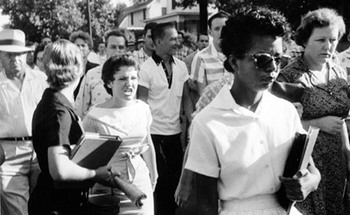 Today is the 50th anniversary of the desegregation of Central High School in Little Rock, Arkansas, and the photo to the left is an iconic representation of that important event in American history: Black student Elizabeth Eckford heads into the school surrounded by a taunting and angry crowd, as behind her a white classmate hisses at her, face contorted in the ugliness of racial hatred. That girl was Hazel Bryan Massery — and 40 years later, she and Eckford were reuinted for a photo, and became, surprisingly, great friends, beginning a relationship sprung from their intertwined roots in that larger story which still marks it with angst and raw feelings on both sides. Vanity Fair's David Margolick chronicles this and other events springing from that day 50 years ago in "Through a Lens, Darkly" — an 11,000 word opus tracing what happened to Eckford and the rest of the Nine after that day:
Today is the 50th anniversary of the desegregation of Central High School in Little Rock, Arkansas, and the photo to the left is an iconic representation of that important event in American history: Black student Elizabeth Eckford heads into the school surrounded by a taunting and angry crowd, as behind her a white classmate hisses at her, face contorted in the ugliness of racial hatred. That girl was Hazel Bryan Massery — and 40 years later, she and Eckford were reuinted for a photo, and became, surprisingly, great friends, beginning a relationship sprung from their intertwined roots in that larger story which still marks it with angst and raw feelings on both sides. Vanity Fair's David Margolick chronicles this and other events springing from that day 50 years ago in "Through a Lens, Darkly" — an 11,000 word opus tracing what happened to Eckford and the rest of the Nine after that day:
In all the documentaries over the years, it is invariably at [the] moment, when Elizabeth and the other eight ascend Central's stately stairs and walk through its grand wooden doors, that the music swells and the credits begin to roll: the story is over. In fact, the world only stopped watching. Within a few weeks Sputnik went up, and everyone had an excuse to look elsewhere. But for the Little Rock Nine, the mob didn't so much disperse as move inside the building. And the more the world looked away, the worse things got.
"Worse" for Elizabeth were things like being pelted with things like tomatoes, eggs, broken glass, "rock-filled snowballs" and a rain of sharpened pencils; being shoved and kicked and knocked down; being called "nigger" constantly (one boy sitting behind her muttered it all through history class); being scalded in the showers after gym when her classmates would coordinate to flush all the toilets at the same time; being taught by teachers claiming that "slavery actually civilized blacks" and "the Ku Klux Klan was founded to defend white womanhood"; being completely and utterly ignored.
There's more that is just as poignant from Elizabeth's current history — like the fact that her life's savings basically consist of her Congressional Gold Medal, worth about $35,000, which she has so far been unable to unload — and the friendship with Massery, late in life, is just part of it (but a fascinating part of it, how two faces immortalized in history grow up to forge some kind of uneasy understanding). Margolick calls it "one of the best things I've written," which is saying something. It's fitting to mark a 50-year anniversary with a reminder that it's been a long 50 years for the people who actually lived through it, and the story is still going on. One need only look back a week to the another number - the Jena 6 - to see that.
Through A Glass, Darkly [VF]